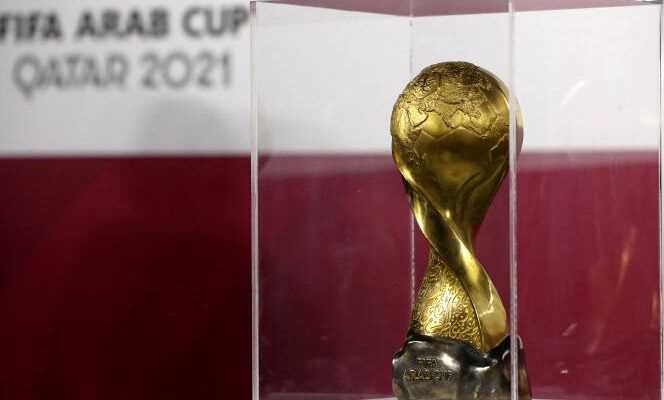To stay up to date with African news, subscribe to the “World Africa” newsletter from this link. Every Saturday at 6 am, find a week of current events and debates treated by the editorial staff of “Monde Afrique”.
Five weeks before the kickoff of the African Cup of Nations (CAN), the Arab Football Cup, which begins Tuesday, November 30 in Qatar, will serve as a dress rehearsal for six African selections qualified for the two events. Algeria, Egypt, Morocco, Mauritania, Sudan and Tunisia will be able to compete in an international level competition on the lawns of the emirate which is also due to host the World Cup in 2022.
On the Algerian side, several pillars of the champion team of CAN 2019 are summoned to the Persian Gulf for this tournament organized by the Union of Arab Football Associations (UAFA) since 1963. Among them: Raïs M’Bolhi, Djamel Benlamri, Mehdi Abeid or Baghdad Bounedjah, players who mainly play in Qatari and Saudi clubs.
“Djamel Belmadi [le sélectionneur algérien] considers this Arab Cup as part of the preparation for the CAN. And that’s why so many executives of his team will compete in this competition which is taken very seriously. », Explains a member of the Algerian Federation.
This approach is shared by Morocco, winner of the last Arab Cup, played in 2012 in Saudi Arabia. But also by the coaches of Tunisia, Egypt, Sudan and Mauritania who, even deprived of their players playing in Europe, will rely on their usual framework.
A godsend for the staffs and players
” This tournament falls at the right time in the calendar. Apart from two absent due to injury, I will be able to count on 90% of my workforce, explains Hubert Velud, the French coach of Faucons de Jediane, the Sudanese team. We will therefore be able to use this tournament as a real preparation, facing quality opponents and benefiting from excellent facilities to work. “
The Arab Cup is indeed seen as a boon by the technical staff and the players, who will benefit from the modern sports infrastructure of the emirate, while the matches will be played in seven of the eight stadiums selected for the World Cup. In addition, the teams will play in climatic conditions comparable to those they will experience in Cameroon, host country of the CAN, from January 9th.
” Compared to other teams qualified for CAN, those in Qatar have a small advantage in the field of preparation because, in addition to collective training, each team will play at least three matches. », Intervenes the French Didier Gomes Da Rosa, appointed in November at the head of Mauritania after the dismissal of his compatriot Corentin Martins.
The new coach of Mourabitounes, in addition to getting to know his players better, also sees this Arab Cup as an opportunity to test new profiles or to give playing time to others: “I consider that 70 to 80% of the workforce present in Qatar will be in Cameroon. The rest is made up of newcomers or players who hadn’t been in the squad for some time. Because we must prepare the CAN, but also the future, in particular the qualifications for the CAN 2023, which will begin in a few months. “
The course of the Arab Cup will force the coaches to reflect. ” If a new or returning player is signaled by good performances, this can encourage a coach to make choices when making his final CAN list. », Concludes Hubert Velud.
Composition of groups (the first two in each group qualify for the quarter-finals)
Group A: Qatar, Iraq, Bahrain, Oman
Group B: United Arab Emirates, Tunisia, Mauritania, Syria
Group C: Saudi Arabia, Morocco, Palestine, Jordan
Group D: Algeria, Sudan, Egypt, Lebanon
